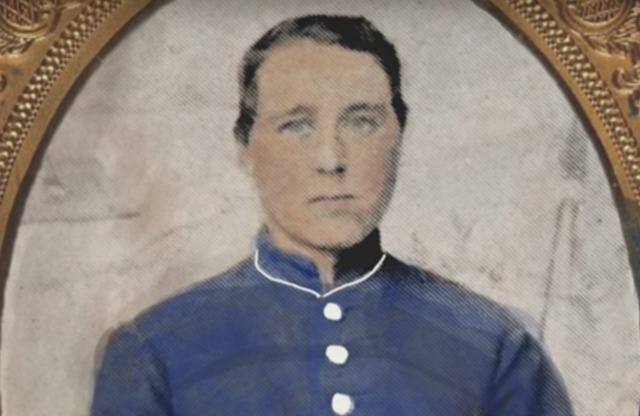Remembering Albert Cashier, Illinois' Civil War Hero & Transgender Trailblazer
By Stephen Gossett in News on Jul 26, 2017 6:50PM

Albert Cashier / 'We've Been Around'
LGBTQ organizations and Democratic lawmakers from Illinois were quick with rebukes after President Donald Trump announced this morning that the military under his administration would bar transgender people from serving.
As Sen. Tammy Duckworth, who lost both her legs while serving in the Iraq war, said in a statement, "If you are willing to risk your life for our country and you can do the job, you should be able to serve—no matter your gender identity, sexual orientation or race. Anything else is discriminatory and counterproductive to our national security."
Gender-nonconforming people from our state have in fact been serving in the military to help preserve that national security for a very long time. One of the most remarkable cases is that of Albert Cashier, a transgender man who fought in the Civil War with the 95th Illinois Regiment.
Cashier was born in Ireland in 1843, as Jennie Hodgers, before making the trip across the Atlantic at the age of 17, eventually settling in Illinois and—in 1862—joining the Union army. As the New York Times noted in 2014, there are hundreds of accounts of women passing as men in order to serve, but fewer stories like Cashier, who "had been passing long before the fighting started" and would live most of his life as a transgender man thereafter—until others exposed him and forced otherwise shortly before his death.
Cashier's story was documented last year in the We've Been Around short-doc series, which spotlighted under-told stories of historic trans people. Cashier was involved in over 40 engagements military engagements as a soldier and once climbed a tree, while dodging bullets, to raise a U.S. flag, according to the film.
"As a young private, Cashier had fought at the siege of Vicksburg, where he and his comrades broke the spine of the Confederacy, and his name was inscribed on the Illinois victory monument there," wrote the New York Times.
After the war, Cashier suffered a broken leg when he was struck be a car while working as a handyman for a lawmaker, in downstate Saunemin, Illinois. His boss arranged to have him convalesce at a soldiers' home in order to help preserve his identity. But he was soon discovered after being transferred to a state mental facility, when Cashier showed symptoms of dementia.
There, Cashier was forced to wear skirts "for the first time in over 50 years," according to the Times. In the cruelest irony, Cashier—"unused to walking in the long, cumbersome [dress] garments" fell and broke a hip. He never recovered from the injury and died on Oct. 11, 1915.
"His comrades from the 95th gathered once more to make sure their brother in arms was buried as the man they knew him to be… He was laid to rest in his Union blues," says the narrator in the film.
You can donate to Trans Lifeline here. If you're active-duty transgender service member, the American Civil Liberties asks you to contact the organization here.